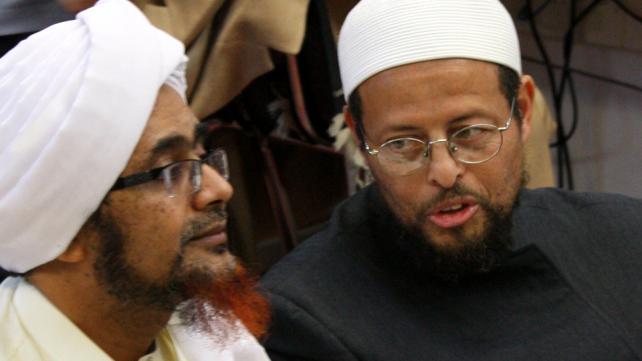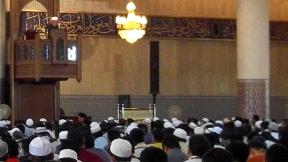
Domestic violence, as one of many social problems in societies around the world, is the problem of Imams, as it is of women, men and families. Imams can play a positive role in ridding Muslim families of this sickness.
Domestic violence is a form of abuse that can be physical, verbal and emotional. When it is physical, it includes slapping, punching, kicking, and hitting. Verbal abuse includes cursing, insulting and humiliating.
Domestic violence is not condoned by Islam. This is clear from the Quran, which describes the relationship of marriage as one of love and mercy, as well as the clear example and sayings of our beloved Prophet Muhammad (peace and blessings be upon him). No scholars using the Quran and Sunnah as the basis of their arguments have can ever condone domestic violence.
Below are seven suggestions on how Imams can deal with the issue of domestic violence in non-Western countries:
1. Start by approaching the issue indirectly
In many societies, issues that take place in the home are considered private and no one is allowed to discuss problems in the home outside of it. This is why bringing an issue as sensitive as domestic violence to the attention of Muslims needs to be done very carefully.
For the Imam, the best way to do this is to talk about domestic violence in the context of how husbands should treat their wives in Islam in the Juma Khutba (Friday sermon).
A Khutba or discussion on this topic could be structured in the following way:
- Mention some of the verses of the Quran and hadith on the topic of the importance of men taking care of women.
- Then you can briefly describe how kind the Prophet Muhammad was with his wives.
- Then mention that he was married 38 years of his life and never hit his wives.
- After this, you could discuss the issue of conflict resolution in marriage. You could start off giving the example from the Quran (4:34-35) regarding how Islam talks about disputes between husbands and wives. Explain clearly that this does not give a husband permission to physically abuse his wife.
- Mention the steps in verse 4:34-35 are only applicable if the man is totally innocent and the woman is at fault.
- Explain that the last step referred to in this verse is a symbolic gesture with Miswak which is only allowed in two cases: 1. if the wife is guilty of lewd behavior 2. if the wife, without any medical reason, refuses to share his bed.
- Be clear and give examples of the kinds of abuse that do exist. For example, a husband regularly threatening to divorce his wife, intimidating her, telling her she is a failure, that she will go to Hell. Telling her he has a right from Allah to abuse her. Mention that abuse in Muslim homes includes pushing, slapping, punching, kicking, beating, bondage, and refusing to help a wife when she is sick or injured.
- Remind people that the Islamic rules of good behavior apply to one's family just as much as to the Muslim community.
- Remind people that Allah does not turn down the Dua (supplication) of the oppressed person, and if a man is abusing his wife and she makes a Dua against him, Allah, if He wills, will accept it and make it happen.
- Remind people that it is Haram (forbidden) to curse and to beat leaving marks even children, let alone adult women.
A note of caution: if you do decide to use an example of domestic violence from the community, make sure not to disclose details which will make it obvious to listeners which couple is being discussed. This is humiliating and can make the situation for the woman, especially worse, if her husband feels he is being openly talked about in a negative manner.
2. Be open to the concerns of women
Make sure your mosque is open to both men and women. Remember that it is the right of Muslim women to go to the mosque, according to Allah and His Prophet. From here, make sure you are able to discuss issues of concern and importance to women. This can be on the telephone, it can be during established office hours or other means which are practical and useful. The Imam is the leader of the community, not of men only.
3. Do not share their secrets
If a man or woman comes to you and discusses the problem of domestic violence in your home, you must not tell anyone. This is a trust (Amana) from Allah, and you must keep their secrets guarded.
4. Talk about the marriage relationships in a study circle
If you teach a study circle or an Islamic class, make sure that the topic of marriage is discussed in detail. Domestic violence should be one of the issues that is covered under this topic. Make the Islamic position on this topic clear and be open to the questions and address the misunderstandings about the husband-wife relationship which continue to plague Muslims.
5. Give your name to a local women's shelter or a crisis line
If you live in a city where there is a women's shelter or a crisis line, give your name as a resource person. Your support as an Imam will also give credibility to the work the shelter and crisis line are doing, as well as to the problem of domestic violence itself.
6. Be willing to advise husbands who do this and take further action
Be ready to privately give Naseeha (advice) to a man you know who abuses his wife. If things become worse, talk to elders in the family to deal with the situation. In a worst case scenario, where the issue becomes one of life and death, be ready to not only speak out, but intervene with the help of police to end the abuse of the wife and in most cases, the children.
7. Make Dua
As the Imam, the lives and well-being of its members are part of your responsibility. Make Dua that Allah helps you in this heavy task and that He eases the difficulties of all those suffering in the community, men, women and children.
Photo Attribution: Buhadram - http://commons.wikimedia.org/wiki/File:Habib_umar_with_imam_zaid_shakir.jpg








Add new comment